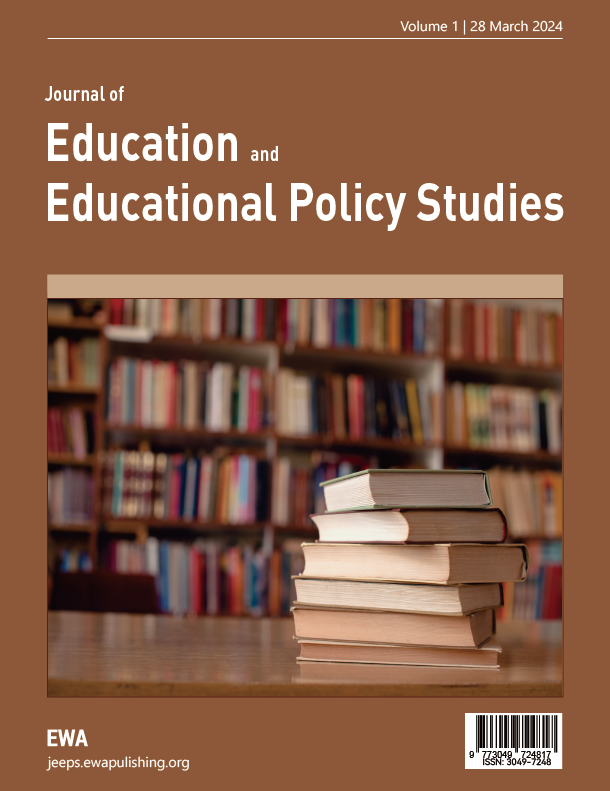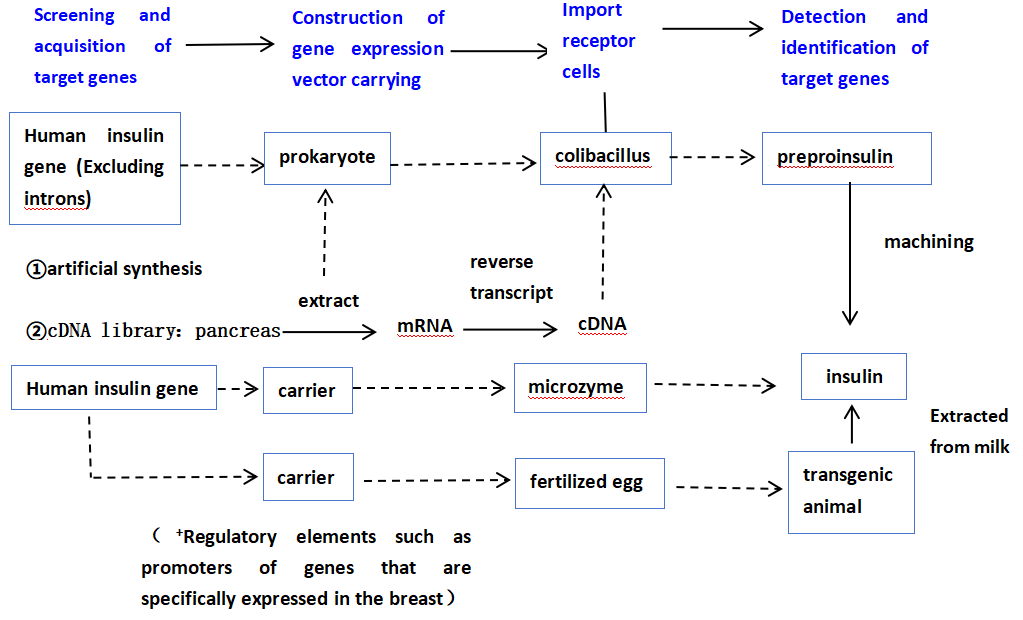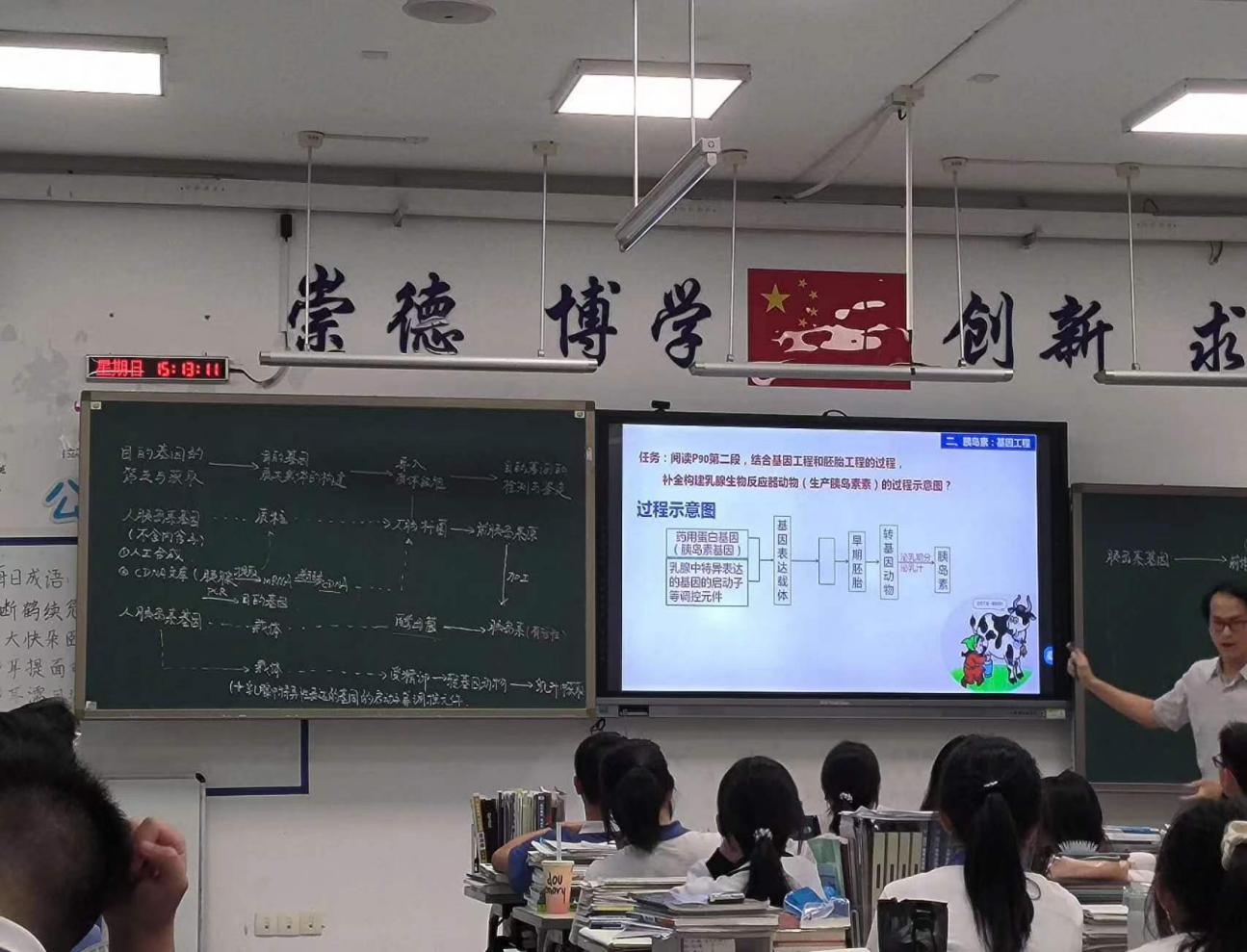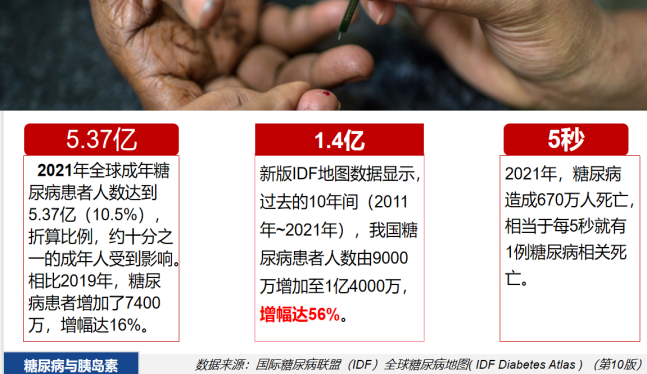1.Introduction
In April 2022, during an inspection visit to Renmin University of China, General Secretary Xi emphasized: “Accelerating the construction of a philosophy and social sciences system with Chinese characteristics ultimately comes down to building an independent knowledge system for China” [1]. As a subject that examines the processes of teaching and learning in biology, biological pedagogy is part of the broader realm of philosophy and social sciences. Constructing an independent knowledge system for this discipline is not only a significant responsibility but also a key element in developing an educational theoretical framework with Chinese characteristics. Furthermore, it represents a strategic imperative placed on biological pedagogy in the pursuit of the national goals of becoming a modern power in education, science and technology, and talent development. Therefore, this paper seeks to explore, from an educational standpoint, the research background, significance, approaches, and methods involved in building an independent knowledge system in biological pedagogy. It will also elaborate in detail on the four key components of a modern independent knowledge system in the field: the disciplinary cluster system, disciplinary knowledge system, academic system, and discourse system.
2.Research background and significance
The construction of an independent knowledge system in biological pedagogy first requires a thorough understanding of relevant concepts, such as “biological pedagogy” and “independent knowledge system.” Biological pedagogy is a discipline that focuses on the teaching and learning processes within the field of biology [2]. Grounded in educational theory and pedagogy, and using biological science as a medium, it aims to explore effective methods for talent cultivation and uncover the underlying educational principles. As emphasized in the Interpretation of the General High School Biology Curriculum Standards, “The curriculum standards’ emphasis on life concepts profoundly reflects their educational value” [3]. This indicates that the question of how to cultivate talent lies at the very heart of high school biology education.
Against the broader backdrop of China's modernization, understanding the term “independent knowledge system” hinges fundamentally on the concept of “independence.” Many scholars in the field of education have already begun to explore the development of a uniquely Chinese educational knowledge system. Professor Yu once pointed out, “When discussing the independent knowledge system of Chinese pedagogy, the notion of ‘Chineseness’ seems clear but can actually lead to divergent interpretations” [4]. Similarly, understanding the independent knowledge system of biological pedagogy requires careful consideration of its “independence,” which is closely tied to its “Chineseness.” Here, “independence” can be regarded as synonymous with “Chinese characteristics.” However, equating it with something exclusive to China would be overly narrow. Instead, we should understand “independence” as referring to the formation of Chinese characteristics through the inheritance of tradition, the integration of past and present, and the assimilation of both domestic and international cultural achievements. With such Chinese characteristics in place, we can then develop “Chinese solutions” and “Chinese wisdom” tailored to the country’s national conditions. This idea is also highlighted in General Secretary Xi Jinping’s remarks: “To solve China’s problems and propose Chinese solutions to global issues, we must uphold the Chinese worldview and methodology” [5].
At the May 2016 symposium on philosophy and social sciences, Xi Jinping stressed the importance of “accelerating the establishment of a disciplinary system, academic system, and discourse system for philosophy and social sciences with Chinese characteristics” [6]. This implies that, in constructing an independent knowledge system for disciplinary pedagogy, in-depth research should center around the disciplinary, academic, and discourse systems. In the context of biological pedagogy, building its disciplinary structure can be divided into two main aspects: the construction of a disciplinary cluster system and the construction of a disciplinary knowledge system. The disciplinary cluster system involves categorizing disciplines based on specific principles to form a comprehensive framework that facilitates both teaching and research. The disciplinary knowledge system refers to the collective body of knowledge, ideas, and theories within a discipline. It forms an organic, interconnected structure of knowledge. The academic system seeks to reveal the essence and laws governing the subject of research, thereby systematizing, theorizing, and institutionalizing academic inquiry within the discipline. It develops into a coherent framework of epistemology, axiology, and methodology [7]. The discourse system pertains to the usage and rules of language and discourse across different sociocultural contexts, encompassing fields such as pragmatics and discourse analysis. These four systems are interdependent and mutually influential, collectively forming the structural framework of the modern independent knowledge system of biological pedagogy.
In summary, the study of an independent knowledge system in biological pedagogy is particularly urgent. As an interdisciplinary field that bridges biology and education, current research in both the scientific and educational communities tends to be dominated by Western paradigms, often relying on Western knowledge systems to analyze and solve problems. This has led to many mismatches with the realities of Chinese education. To better serve China’s educational practices and talent cultivation needs, it is imperative to undertake the challenging yet vital task of constructing a localized and independent knowledge system for biological pedagogy.
3.Research pathways
The construction of an independent knowledge system in biological pedagogy must begin with distilling practical educational experience from a historical perspective. Historically, the earliest written work devoted to the discussion of education and teaching originated in ancient China. The essay Xue Ji (On Learning), found in the Book of Rites, predates the earliest Western pedagogical text—Institutio Oratoria by the Roman educator Quintilian—by over 300 years. This fact is a testament to the long-standing heritage of Chinese educational culture. Within this deep-rooted tradition, educators from Confucius, Xunzi, and Mencius in the Spring and Autumn and Warring States periods to modern figures such as Cai Yuanpei, Yan Yangchu, Huang Yanpei, and Tao Xingzhi have left behind a rich legacy of educational thought. In building an independent knowledge system for biological pedagogy, we should draw upon the valuable intellectual heritage independently developed through their educational practices, preserving the essence while discarding the outdated, thereby actively inheriting and promoting this enduring tradition to strengthen its depth and sustainability.
Constructing an independent knowledge system for biological pedagogy must also involve deep engagement with schools, classrooms, and front-line teaching. As Professor Xu emphasized, “Practicality should be the cornerstone of the construction of a Chinese educational knowledge system: we must stay grounded in practice and return to it” [4]. The independent knowledge system of biological pedagogy is intended to serve education with Chinese characteristics. Therefore, it must draw experience from practice and be applied back into practice. The Fundamentals of Marxism (2023 edition) explains that “the process of human understanding of the world is a cyclical movement from practice to cognition, and from cognition back to practice” [8]. With over nine years of experience in front-line biology education, the author deeply understands the challenge of applying theory to practice. Despite national advocacy for quality education and reducing academic burdens, parents continue to have high expectations for their children, and public attention toward the college entrance examination (Gaokao) remains intense. These factors have led to a disconnect between the theoretical foundations and practical implementation of biology education. In alignment with the national educational policy of cultivating virtuous individuals, how can we ensure that talent development remains at the core of teaching? How should we strike a proper balance when reducing academic burdens? Are we educating students solely for the Gaokao? How can we guide students to engage with life and discover meaning in their existence? These questions demand not only theoretical exploration but also ongoing inquiry and experimentation in teaching practice, guided by an in-depth understanding of an independent knowledge system in biological pedagogy.
Furthermore, the construction of an independent knowledge system in biological pedagogy requires cross-cultural learning and a dialogue between tradition and modernity. This involves innovating on the basis of existing educational theories while taking into account China's national conditions. Without innovation, no new knowledge or knowledge system can emerge. General Secretary Xi Jinping has made it clear: “Chinese modernization is deeply rooted in the fine traditional culture of China. It embodies the essential principles of scientific socialism, draws upon the best achievements of human civilizations, represents the developmental direction of human progress, and offers a new vision different from the Western model of modernization—a brand-new form of human civilization” [9]. Clearly, innovation is the foundation of both independence and leadership. It must be firmly grounded in practical experience and adapted to China's real conditions, ensuring that the disciplinary cluster system, disciplinary knowledge system, academic system, and discourse system in biological pedagogy reflect Chinese characteristics.
Finally, the construction of an independent knowledge system in biological pedagogy must be rooted in the broader knowledge system, promoting the transformation of teachers’ tacit knowledge into explicit knowledge, and further systematizing the latter. Knowledge is the crystallization of humanity’s understanding of the world (including of itself) formed through practice. It originates from refined and organized insights gained through various means and forms the foundation of the human scientific system. Human cognition is complex and dynamic, and in order for its results to be preserved and passed down, the generation of knowledge becomes essential. This process involves integrating new knowledge with existing knowledge stored in the brain, ultimately forming a systematic and stable knowledge structure.
4.Research methods
4.1.Literature research method
This study primarily adopts the literature research method. The author accessed and analyzed a large number of academic sources through platforms such as CNKI (China National Knowledge Infrastructure) and Baidu Scholar, conducting in-depth reading, analysis, and systematic note-taking. In addition, extensive use was made of library resources to consult relevant books and journals, while supplementary materials were gathered from the internet. These included, but were not limited to, compilations of General Secretary Xi Jinping’s speeches, detailed studies of the Information and Documentation—Rules for Bibliographic References and Citations to Information Resources (GB/T 7714-2015), and the formatting requirements for academic theses. While retrieving information through online databases such as CNKI, the author observed that research specifically focused on biological pedagogy or biology education remains relatively scarce. Although the development of an independent knowledge system has received considerable scholarly attention, there is currently no specialized research in China dedicated to the construction of an independent knowledge system for biological pedagogy. This highlights an urgent need to expand and enrich research in this field.
4.2.Case analysis method
Drawing on years of teaching experience, the author conducted an in-depth case analysis of a public demonstration lesson delivered by a young teacher on May 12, 2023, at the Shenzhen School affiliated with Renmin University of China. The lesson was titled A Century of Insulin: From Genetic Engineering to Protein Engineering, corresponding to Section 4, Chapter 3, of the selective compulsory module 3 in the People’s Education Press high school biology textbook. The analysis examined the lesson from three key dimensions of biological pedagogy: the knowledge system, academic system, and discourse system. It explored how to conduct classroom teaching more effectively within these frameworks. The main conclusion drawn is that to improve the quality of newly taught content in high school biology, teachers must engage in careful instructional design that systematizes disciplinary knowledge, integrates academic perspectives, and refines pedagogical discourse in advance of classroom instruction.
5.Four dimensions of the independent knowledge system in biological pedagogy
The foundation of a knowledge system lies in the social conditions and social practices that shape it. In the context of contemporary China, the issues addressed by educational research are primarily derived from local educational practices. This fundamentally determines the distinct characteristics of China's contemporary educational knowledge system [10]. To effectively construct an independent knowledge system for biological pedagogy, it is essential to deeply extract, summarize, analyze, and reapply indigenous educational experiences. This process aims not only to resolve domestic challenges but also to contribute insights and propose “Chinese solutions” and “Chinese wisdom” to address common global issues. By thoroughly exploring China's educational practices, focusing on China-specific problems, and immersing in frontline education, researchers can ultimately “write research findings on the land of China.” This is also the core purpose of the author’s study on constructing an independent knowledge system for biological pedagogy.
The modern independent knowledge system of biological pedagogy comprises four key components: the disciplinary cluster system, the disciplinary knowledge system, the academic system, and the discourse system. Among these, the academic system is central—it forms the foundation of the other three components. These four systems are interconnected and mutually influential, collectively constituting the framework of an independent knowledge system in contemporary biological pedagogy.
5.1.Constructing the disciplinary cluster system of biological pedagogy
Establishing a disciplinary cluster system in biological pedagogy is a new educational model aimed at enhancing the effectiveness of teaching and learning. It serves as an effective approach to fulfilling the training objectives of both undergraduate programs in biological sciences (teacher education track) and Master of Education programs specializing in biology teaching. This system integrates biology teaching with other education-related disciplines, promoting the optimization of course structures, integration of teaching resources, and the development of instructional teams, with the ultimate goal of cultivating practice-oriented talent that meets national and societal needs.
A disciplinary cluster refers to a group of disciplines that share a common attribute, categorized based on specific principles to form a structured disciplinary framework that facilitates teaching and research [11]. Biological pedagogy is an interdisciplinary field that lies between biology and education. Accordingly, it has given rise to a set of integrated, interdisciplinary courses based on the clusters of biology and education—namely, the biological pedagogy disciplinary cluster. This cluster can be built from three perspectives: biology, education, and biological pedagogy (see Figure 1).
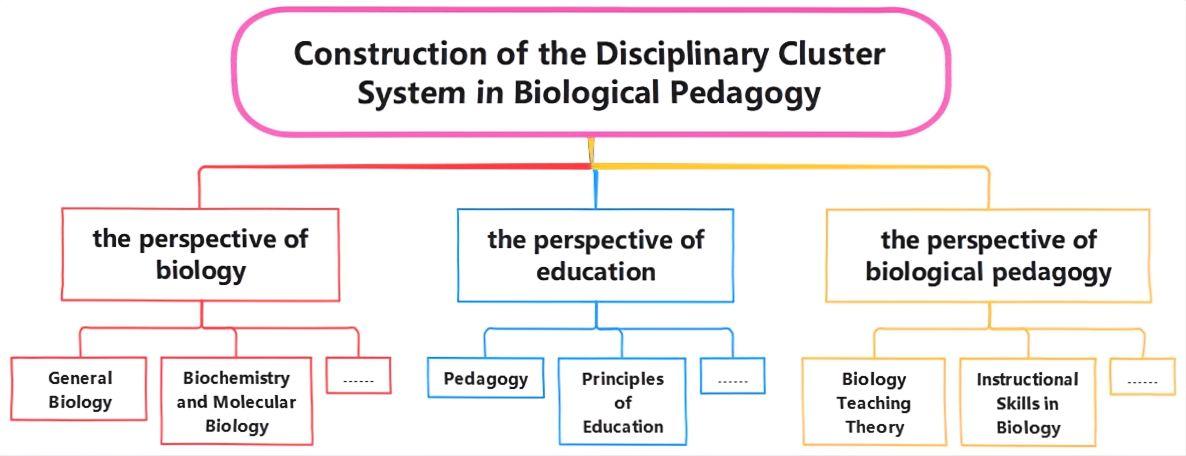
Figure 1. Construction of the disciplinary cluster system in biological pedagogy
From the biological perspective, constructing the disciplinary cluster system involves organizing core disciplines according to their internal logic and the patterns by which students develop knowledge, competencies, and qualities, thereby forming a core professional disciplinary structure. According to the National Standards for Teaching Quality in Undergraduate Majors at Regular Institutions of Higher Education, six (or eight) core biology disciplines are defined: General Biology (or Zoology, Botany), Microbiology, Biochemistry and Molecular Biology (or Biochemistry, Molecular Biology), Cell Biology, Genetics, and Ecology [12]. Supporting disciplines include Frontiers in Biological Knowledge, Human Anatomy, and Slide Specimen Preparation, while related disciplines include Human Diseases and Prevention, Medicinal Botany, and Floral Art, thus forming a tiered system of core, supporting, and related disciplines. From the educational perspective, the core disciplines of the cluster include Pedagogy, Principles of Education, Educational Psychology, Curriculum and Instruction, History of Chinese Education, and History of Foreign Education. From the biological pedagogy perspective, the cluster reflects the interdisciplinary nature of biological pedagogy. Core courses include Biology Curriculum and Instruction (also known as Biology Teaching Theory), Biology Instructional Design, Instructional Skills in Biology (also referred to as Microteaching), Research on Biology Experimental Teaching, and Core Professional Competencies for Biology Teachers. Practical components include Educational Observation and Teaching Practicum.
According to Professor Hu, the overarching goal of building the disciplinary cluster system for biological pedagogy is to cultivate teacher education students and future educators with the “one specialization and multiple competencies” profile and mastery of five essential teaching capabilities [13]. Therefore, the construction of this system should focus on cultivating professionals with a modern educational outlook, solid theoretical foundations, strong practical abilities, and a firm grasp of the basic theories of biology instruction. These individuals should be capable of teaching, managing, and conducting research in secondary school biology, proficient in the application of educational technologies, and well-versed in the development trends and current advancements in curriculum and instruction both in China and abroad.
5.2.Constructing the disciplinary knowledge system of biological pedagogy
The disciplinary knowledge system of biological pedagogy refers to the comprehensive body of knowledge, concepts, and theories within the field. It is an organic and interrelated structure of knowledge. The Professional Standards for Secondary School Teachers (Trial), officially issued and implemented in 2012, represents the most authoritative national standard for the secondary school teaching profession and serves as a fundamental guideline for education authorities at various levels in constructing the teaching workforce. According to this standard, a qualified secondary school teacher must “understand the knowledge system, fundamental ideas, and methods of the subject they teach” [14]. This underscores the critical importance of constructing a coherent disciplinary knowledge system for biological pedagogy, particularly for cultivating future educators and key teaching professionals.
Within the disciplinary cluster of biological pedagogy (see Figure 1), each specific subject requires an investigation into the construction of its own internal knowledge system. Therefore, the disciplinary cluster system and the disciplinary knowledge system of biological pedagogy are closely interrelated. The most direct representation of the disciplinary knowledge system in biological pedagogy is the textbook. The construction of textbook-based knowledge systems in this field follows a dual logic: one is the internal logic of disciplinary knowledge, and the other is the pedagogical logic of teaching the knowledge [15]. When preparing lessons, high school biology teachers must design their instruction based on both of these dimensions—internal coherence of content and effective delivery—thereby professionalizing and systematizing their preparation.
On May 12, 2023, the author conducted a public demonstration lesson for young teachers at the Shenzhen Branch of The High School Affiliated to Renmin University of China (RDFZ), titled “A Century of Insulin: From Genetic Engineering to Protein Engineering” (from Section 4, Chapter 3 of the Elective Module 3 in the People’s Education Press version of the senior secondary biology textbook). This lesson, as part of a specialized thematic series, was carefully designed by the author with attention to the systematization of disciplinary knowledge, academic rigor, and refined pedagogical discourse. The content integrated relevant topics from two different modules: the regulation of hormones and diabetes-related content in Elective Module 1 (Section 2, Chapter 3), and the applications of genetic engineering and insulin production in protein engineering from Elective Module 3 (Sections 3 and 4, Chapter 3) (see Figure 2).

Figure 2. PPT slides from the lesson “A century of insulin: from genetic engineering to protein engineering”
(Note: The presentation of knowledge frameworks and flowcharts in the PPT reflects a systematic and structured design of disciplinary content.)
By analyzing the differences between animal insulin and human insulin molecules, and outlining a basic process for recombinant human insulin production, the author proposed potential optimization strategies (Figure 2). Throughout the instructional process, both the PPT slides and blackboard writing (Figure 3) featured clear knowledge frameworks and flowcharts. These design elements demonstrated a deliberate effort to organize subject content in a systematic and structured manner, which greatly supports students in memorizing, understanding, and applying knowledge logically and comprehensively.
|
|
|
(a) |
|
|
|
(b) |
Figure 3. Blackboard diagrams from the lesson “A century of insulin: from genetic engineering to protein engineering” (a & b)
(Note: The blackboard diagrams highlight the systematic and structured design of the subject content.)
5.3.Constructing the academic system of biological pedagogy
The academic system of biological pedagogy is a structured body of theories and knowledge that reveals the essential nature and inherent laws of the subject. It systematizes, theorizes, and disciplines the research domains, methods, and outcomes within biological pedagogy, forming an epistemological, axiological, and methodological framework [7]. This academic system serves as a key intermediary and hub linking the disciplinary cluster system, knowledge system, and discourse system of biological pedagogy. It is the foundation and core of an independent knowledge system within the discipline. The development of the academic system directly influences and determines the construction of an autonomous knowledge system in biological pedagogy. A robust academic drive and strong theoretical support are essential for the development of this independent knowledge system, particularly the disciplinary knowledge system.
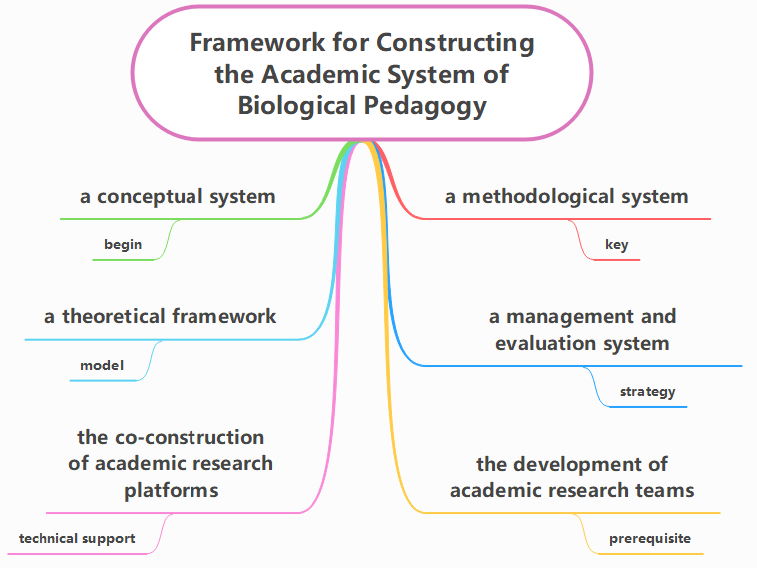
Figure 4. Framework for constructing the academic system of biological pedagogy
The construction of the academic system of biological pedagogy (Figure 4) begins with a conceptual system, is modeled on a theoretical framework, hinges on a methodological system, leverages a management and evaluation system, relies on the co-construction of academic research platforms for technical support, and depends on the development of academic research teams as a prerequisite. The conceptual system of biological pedagogy is formed by arranging concepts according to their levels of abstraction and interrelationships [16]. It functions like a network of nodes that continuously connect and restructure the vast sea of knowledge and theory, thereby laying the foundation for the discipline’s structure.
The theoretical system of biological pedagogy comprises a comprehensive structure of concepts, categories, and principles concerning specific entities, objects, or domains [16]. The development of the academic system is consistent with the development of its theoretical framework: theory originates in practice and simultaneously constitutes the content of the academic system. The management and evaluation system are the “bull’s nose” of the academic system—serving as the conductor’s baton, weathervane, and driving force in its construction. It can guide and stimulate the high-quality, innovative development of the academic system. The methodological system of biological pedagogy refers to the comprehensive framework composed of different types and levels of research methodologies used in academic inquiry. It is the key element in building the academic system and plays a pivotal role. The core of developing the disciplinary cluster of biological pedagogy lies in constructing its academic system, and the key to building the academic system lies in the development of its methodological framework.
The co-construction of academic research platforms provides technical support for building the academic system. Meanwhile, the development of academic research teams serves as the foundation, guarantee, and prerequisite for academic system construction. Encouraging and guiding primary and secondary school biology teachers to participate in academic research is an important pathway for theorizing classroom practice and a primary method for ensuring the academic system serves pedagogical practice. During teaching, K-12 educators can integrate theoretical achievements into their instruction. To construct the course content systematically, teachers must engage in academic literature review, research, and analysis to design lessons that are more scholarly and professional. This approach enables the integration of academic rigor and scientific thinking into classroom teaching.
|
|
|
|
(a) |
(b) |
Figure 5. Scenario-based introduction in the lesson “A century of insulin: from genetic engineering to protein engineering”
(Note: Data sources such as diabetes prevalence rates reflect the scholarly and professional design of the lesson.)
In the lesson “A Century of Insulin: From Genetic Engineering to Protein Engineering,” the author introduced the topic using diabetes prevalence data sourced from the IDF Diabetes Atlas (Figure 5), raising the question: “Given the enormous demand for insulin, how can we achieve mass production?” This scenario-based introduction exemplified the academic and professional nature of the lesson design through its use of authoritative data sources. The instructional progression then moved from the discovery of insulin to the differences and limitations in the extraction of animal and human insulin, to the artificial synthesis of human insulin, and finally to recombinant human insulin. This led to the first teaching task: briefly explain the general process of insulin production using genetic engineering (Figure 6). Throughout the lesson, each image in the PPT was clearly labeled with its source, further underscoring the academic rigor and professional standards of the instructional design.
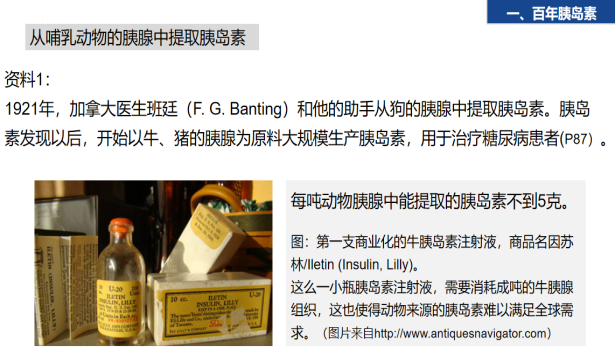
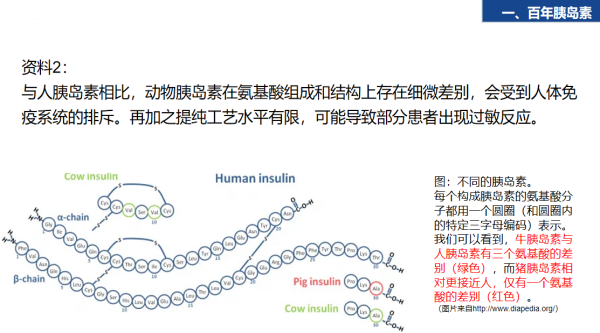
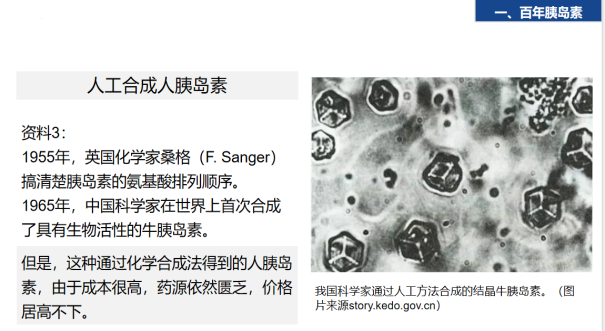
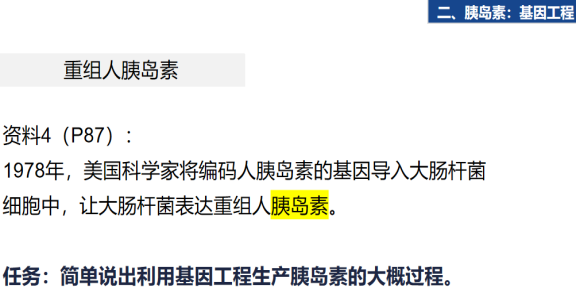
Figure 6. Selected slides from the lesson “A century of insulin: from genetic engineering to protein engineering”
(Note: Every image in the PPT is labeled with its source, reflecting the academic and professional quality of the lesson design.)
5.4.Constructing the discourse system of biological pedagogy
The discourse system of biological pedagogy refers to the ways and rules governing the use of its language and expressions within different social and cultural contexts. It involves areas such as pragmatics and discourse analysis of relevant pedagogical language. General Secretary Xi Jinping emphasized that “each discipline must establish a systematic theory and conceptual framework.” This directive calls for the construction of disciplines that unify academic systems and discourse systems [17]. While the academic system of biological pedagogy reveals the systematic theoretical knowledge of the discipline, its discourse system represents the mode of expression for that knowledge—the linguistic vehicle of the academic framework. Therefore, the construction of a discourse system is essential.
The discourse system of biological pedagogy includes the academic discourse system, textbook discourse system, and teacher discourse system. Among them, the teacher discourse system is the most practical and applied. It encompasses both classroom language and the daily interactive language used between teachers and students, representing a “high-level integration of scientifically rigorous written language and flexible, vivid oral language.” The ancient Chinese educational treatise Xue Ji (On Learning) states: “A good singer inspires others to echo his voice; a good teacher inspires others to follow his will” [18]. This highlights the importance of the art of classroom language, which influences student engagement and the effectiveness of knowledge delivery. Given the broad content covered in each class and the author's precise grasp of biological knowledge, his classroom language is exceptionally concise, clear, and easy to understand—demonstrating a highly refined discourse design.
So, what are the pathways for constructing and optimizing the discourse system of biological pedagogy? Based on case analysis, the author identifies the following: The formation and refinement of the discourse system in biological pedagogy follow their own inherent logic. It is crucial to recognize the foundational role the discourse system plays in the discipline. Emphasize professional and scholarly lesson preparation, and adopt a discourse style that is concise, accessible, and engaging during instruction. Make every effort to establish the central role of teacher-student classroom interaction and daily communicative discourse, thereby ensuring the discourse rights of both parties. Focus on local issues in the development of biological pedagogy and promote the modernization of its discourse system.
6.Conclusion
In summary, the construction of an independent knowledge system in biological pedagogy is not something that can be achieved overnight. It is a cyclical process that originates from practice, undergoes theoretical refinement through research, and ultimately returns to practice. This process exhibits a trend of spiral progression. As noted in The Complete Works of Lenin, “Spiral upward movement is driven by internal contradictions within things. Through repeated struggles between opposing forces, two negations and two transformations occur, where development moves from affirmation to negation and then to the negation of the negation, forming a cycle in which the end of one phase marks the beginning of the next” [19]. The direction and trend of constructing an independent knowledge system in biological pedagogy involve a progressive movement from lower to higher levels, and from simplicity to complexity. This process is characterized by advancement, nonlinearity, and periodicity. It requires continuous research, analysis, and practical application by scholars in the field of biological pedagogy.
Funded project
This research is supported by the Jiangxi Province Basic Education Teaching Reform Project: “Research and Practice on High School Biology Unit Teaching Design Based on Core Literacy” (SZUDHSW2022-1069) and by Jiangxi Province Teaching Reform Project "Construction and Practice of Core Curriculum Group for Biotechnology Major under the Concept of Curriculum Ideology and Politics+OBE" (JXJG-22-6-16)
References
[1]. People's Daily. (2022, April 26). Uphold the leadership of the Party, inherit the red gene, take root in China, and blaze a new trail to build a world-class university with Chinese characteristics. People's Daily, (1).
[2]. Yin, Q. (2007). Discussion on the content and structure of biology education curriculum. Master’s thesis. Shandong Normal University.
[3]. High School Biology Curriculum Standards Revision Group. (2020). Interpretation of the General High School Biology Curriculum Standards. Beijing: Higher Education Press.
[4]. Chen, H., Hou, H., Yu, Q., & Xu, H. (2023). Constructing an independent knowledge system of Chinese pedagogy. Journal of Soochow University (Educational Science Edition), 11(03), 15–39. https://doi.org/10.19563/j.cnki.sdjk.2023.03.002
[5]. Central Commission for Discipline Inspection and National Supervisory Commission. (2023, July 31). Provide scientific guidance for further promoting the Party’s theoretical innovation. CCDI Website.
[6]. The Central Committee of the Communist Party of China. (2017, May 16). Opinions on Accelerating the Construction of Philosophy and Social Sciences with Chinese Characteristics. Xinhua News Agency.
[7]. Fang, S. (2019, August 13). Follow academic rules and promote the construction of academic systems. Chinese Social Sciences Today, (001).
[8]. Editorial Team of The Basic Principles of Marxism (2023 Edition). (2023). The Basic Principles of Marxism (2023 Edition). Beijing: Higher Education Press.
[9]. Xinhua News Agency. (2023, February 7). Xi Jinping emphasized at the opening ceremony of the study and implementation seminar on the 20th CPC National Congress spirit: Correctly understand and vigorously promote Chinese-style modernization. Xinhua News Agency.
[10]. Teng, J., & Wang, X. (2023). On the key dimensions of constructing China's independent educational knowledge system. Journal of Beijing Institute of Education, 37(04), 19–25. https://doi.org/10.16398/j.cnki.jbjieissn1008-228x.2023.04.003
[11]. Xu, N., & Meng, L. (2015). Reflections on the construction of disciplinary clusters in local universities. Journal of Jilin Institute of Chemical Technology, 32(03), 26–29. https://doi.org/10.16039/j.cnki.cn22-1249.2015.03.007
[12]. Teaching Steering Committee of the Ministry of Education for Higher Education Institutions. (2018). National Standards for Teaching Quality of Undergraduate Majors in General Colleges and Universities (Part II) (pp. 222–229). Higher Education Press.
[13]. Hu, J., & Chen, X. (2018). Construction of biology education curriculum groups in normal university biology science programs. Teacher Education Forum, 31(09), 54–58.
[14]. Research Group on Professional Standards for Secondary School Teachers. (2012, February). Professional Standards for Secondary School Teachers (Trial). China Education Network.
[15]. Liu, J. (2023). On the construction of an independent knowledge system for the discipline of ideological and political education. Ideological and Theoretical Education, (10), 4–9. https://doi.org/10.16075/j.cnki.cn31-1220/g4.2023.10.001
[16]. Hou, J., & Hou, H. (2022). On the multidimensional existence of the academic system of comparative education. Comparative Education Review, 44(09).
[17]. Tian, X. (2020, May 15). The scientific connotation and interrelation of disciplinary, academic, and discourse systems. Guangming Daily.
[18]. Le, Z. K. (Warring States Period). The Book of Rites: Record of Learning. Chinese Text Project http://ctext.org/si-shu-zhang-ju-ji-zhu
[19]. Lenin. (1984). The Complete Works of Lenin (Vol. 26, p. 57). Beijing: People's Publishing House.
Cite this article
Zhang,L.;Chen,C. (2025). On the construction of an independent knowledge system in biological pedagogy. Journal of Education and Educational Policy Studies,3(2),74-83.
Data availability
The datasets used and/or analyzed during the current study will be available from the authors upon reasonable request.
Disclaimer/Publisher's Note
The statements, opinions and data contained in all publications are solely those of the individual author(s) and contributor(s) and not of EWA Publishing and/or the editor(s). EWA Publishing and/or the editor(s) disclaim responsibility for any injury to people or property resulting from any ideas, methods, instructions or products referred to in the content.
About volume
Journal:Journal of Education and Educational Policy Studies
© 2024 by the author(s). Licensee EWA Publishing, Oxford, UK. This article is an open access article distributed under the terms and
conditions of the Creative Commons Attribution (CC BY) license. Authors who
publish this series agree to the following terms:
1. Authors retain copyright and grant the series right of first publication with the work simultaneously licensed under a Creative Commons
Attribution License that allows others to share the work with an acknowledgment of the work's authorship and initial publication in this
series.
2. Authors are able to enter into separate, additional contractual arrangements for the non-exclusive distribution of the series's published
version of the work (e.g., post it to an institutional repository or publish it in a book), with an acknowledgment of its initial
publication in this series.
3. Authors are permitted and encouraged to post their work online (e.g., in institutional repositories or on their website) prior to and
during the submission process, as it can lead to productive exchanges, as well as earlier and greater citation of published work (See
Open access policy for details).
References
[1]. People's Daily. (2022, April 26). Uphold the leadership of the Party, inherit the red gene, take root in China, and blaze a new trail to build a world-class university with Chinese characteristics. People's Daily, (1).
[2]. Yin, Q. (2007). Discussion on the content and structure of biology education curriculum. Master’s thesis. Shandong Normal University.
[3]. High School Biology Curriculum Standards Revision Group. (2020). Interpretation of the General High School Biology Curriculum Standards. Beijing: Higher Education Press.
[4]. Chen, H., Hou, H., Yu, Q., & Xu, H. (2023). Constructing an independent knowledge system of Chinese pedagogy. Journal of Soochow University (Educational Science Edition), 11(03), 15–39. https://doi.org/10.19563/j.cnki.sdjk.2023.03.002
[5]. Central Commission for Discipline Inspection and National Supervisory Commission. (2023, July 31). Provide scientific guidance for further promoting the Party’s theoretical innovation. CCDI Website.
[6]. The Central Committee of the Communist Party of China. (2017, May 16). Opinions on Accelerating the Construction of Philosophy and Social Sciences with Chinese Characteristics. Xinhua News Agency.
[7]. Fang, S. (2019, August 13). Follow academic rules and promote the construction of academic systems. Chinese Social Sciences Today, (001).
[8]. Editorial Team of The Basic Principles of Marxism (2023 Edition). (2023). The Basic Principles of Marxism (2023 Edition). Beijing: Higher Education Press.
[9]. Xinhua News Agency. (2023, February 7). Xi Jinping emphasized at the opening ceremony of the study and implementation seminar on the 20th CPC National Congress spirit: Correctly understand and vigorously promote Chinese-style modernization. Xinhua News Agency.
[10]. Teng, J., & Wang, X. (2023). On the key dimensions of constructing China's independent educational knowledge system. Journal of Beijing Institute of Education, 37(04), 19–25. https://doi.org/10.16398/j.cnki.jbjieissn1008-228x.2023.04.003
[11]. Xu, N., & Meng, L. (2015). Reflections on the construction of disciplinary clusters in local universities. Journal of Jilin Institute of Chemical Technology, 32(03), 26–29. https://doi.org/10.16039/j.cnki.cn22-1249.2015.03.007
[12]. Teaching Steering Committee of the Ministry of Education for Higher Education Institutions. (2018). National Standards for Teaching Quality of Undergraduate Majors in General Colleges and Universities (Part II) (pp. 222–229). Higher Education Press.
[13]. Hu, J., & Chen, X. (2018). Construction of biology education curriculum groups in normal university biology science programs. Teacher Education Forum, 31(09), 54–58.
[14]. Research Group on Professional Standards for Secondary School Teachers. (2012, February). Professional Standards for Secondary School Teachers (Trial). China Education Network.
[15]. Liu, J. (2023). On the construction of an independent knowledge system for the discipline of ideological and political education. Ideological and Theoretical Education, (10), 4–9. https://doi.org/10.16075/j.cnki.cn31-1220/g4.2023.10.001
[16]. Hou, J., & Hou, H. (2022). On the multidimensional existence of the academic system of comparative education. Comparative Education Review, 44(09).
[17]. Tian, X. (2020, May 15). The scientific connotation and interrelation of disciplinary, academic, and discourse systems. Guangming Daily.
[18]. Le, Z. K. (Warring States Period). The Book of Rites: Record of Learning. Chinese Text Project http://ctext.org/si-shu-zhang-ju-ji-zhu
[19]. Lenin. (1984). The Complete Works of Lenin (Vol. 26, p. 57). Beijing: People's Publishing House.





